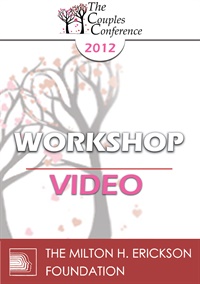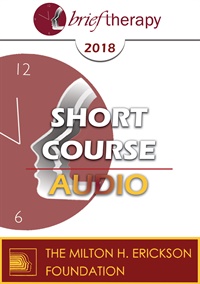
- Average Rating:
- Not yet rated
- Topic Areas:
- Short Courses | Anxiety | Communication | Depression | Neurobiology | Brief Therapy
- Categories:
- Brief Therapy Conference | Brief Therapy Conference 2018
- Faculty:
- Bart Walsh, MSW
- Duration:
- 1:29:10
- Format:
- Audio Only
- Original Program Date:
- Dec 06, 2018
- Short Description:
- Chronic anxiety and depression present significant challenges for those affected by these conditions. A behavioral treatment which accesses deep levels of mindbody functioning facilitates remission of these debilitating conditions. This treatment, conceptualized as essential neurobiological communication (ENBC), incorporates a form of body language known as ideomotor signaling. Because these are chronic conditions, the affected individual learns how to fully manage these states on their own. Also presented is a noninvasive, structured protocol for reducing the adverse influence of unresolved emotion on present experience. Essential to this model is a progressive ratification sequence intended to ground emotional adjustments in thought, perception and behavior. This brief procedure is a useful adjunct to other treatment modalities and instrumental
- Price:
- $15.00 - Base Price
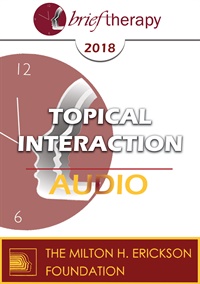
- Average Rating:
- Not yet rated
- Topic Areas:
- Topical Interactions | Brief Therapy | Communication | Evocative Communication | Resources
- Categories:
- Brief Therapy Conference | Brief Therapy Conference 2018
- Faculty:
- Bill O'Hanlon, MS
- Duration:
- 53:03
- Format:
- Audio Only
- Original Program Date:
- Dec 08, 2018
- Short Description:
- What can brief therapy work? In this session, Bill O'Hanlon will make the case that it involves evocation of already existing resources, so the client doesn't have to be fixed, taught new skills or make major changed to resolve problems.
- Price:
- $15.00 - Base Price
- Average Rating:
- Not yet rated
- Topic Areas:
- Clinical Demonstrations | Communication | Couples Therapy
- Categories:
- Brief Therapy Conference | Brief Therapy Conference 1996
- Faculty:
- Ellyn Bader, PhD
- Duration:
- 56:56
- Format:
- Audio Only
- Original Program Date:
- Dec 13, 1996
- Short Description:
- BT96 Clinical Demonstration 10 - Disrupting Couples Conflictual Communications - Ellyn Bader, PhD
- Price:
- $15.00 - Base Price
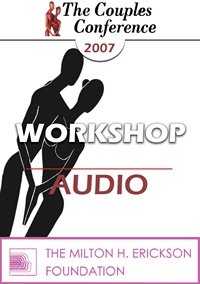
- Average Rating:
- Not yet rated
- Topic Areas:
- Workshops | Couples Therapy | Communication | Relationships
- Categories:
- Couples Conference | Couples Conference 2007
- Faculty:
- Pat Love, EdD
- Duration:
- 2:27:25
- Format:
- Audio Only
- Original Program Date:
- Apr 27, 2007
- Short Description:
- Talking makes many matters worse, not better. Talking can not only exacerbate problems and differences, but prevent the deepest moments of intimacy. Oftentimes therapy focuses too much time talking about connection rather than connecting. Come learn strategies to help couples create love beyond words.
- Price:
- $15.00 - Base Price
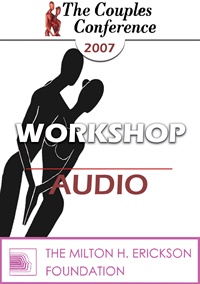
- Average Rating:
- Not yet rated
- Topic Areas:
- Workshops | Couples Therapy | Communication | Confrontation | Relationships
- Categories:
- Couples Conference | Couples Conference 2007
- Faculty:
- Terry Real, LICSW
- Duration:
- 2:08:14
- Format:
- Audio Only
- Original Program Date:
- Apr 27, 2007
- Short Description:
- The repair process is a detailed formula for helping someone in a state of hurt or frustration move back into satisfactory connection. The process begins with the speaker, teaching the distressed person how to use the feedback wheel- a fourstep prescription for speaking that is effective and clean. Then we tum to the skills of listening and responding, laying out techniques of radical generosity-a sophisticated way to understand your partner's experience and respond to it in the most responsible, (and disarming) manner.
- Price:
- $15.00 - Base Price
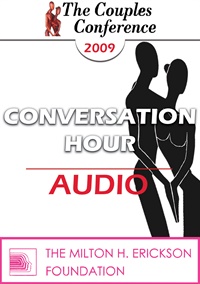
- Average Rating:
- Not yet rated
- Topic Areas:
- Conversation Hours | Couples Therapy | Communication | Relationships
- Categories:
- Couples Conference | Couples Conference 2009
- Faculty:
- Pat Love, EdD
- Duration:
- 52:28
- Format:
- Audio Only
- Original Program Date:
- May 01, 2009
- Short Description:
- CC09 Conversation Hour 02 - How to Improve a Relationship without Talking - Pat Love, EdD
- Price:
- $15.00 - Base Price
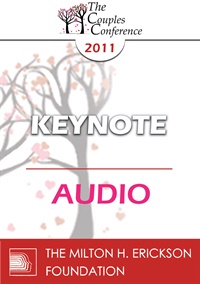
- Average Rating:
- Not yet rated
- Topic Areas:
- Family Therapy | Keynotes | Intimacy | Family Systems | Communication | Couples Therapy
- Categories:
- Couples Conference | Couples Conference 2011
- Faculty:
- Richard Schwartz, PhD
- Duration:
- 56:30
- Format:
- Audio Only
- Original Program Date:
- Apr 03, 2011
- Short Description:
- We have all been taught that our romantic partner should end our misery and make us feel happy and alive. When he or she doesn’t we wonder if they’re the right one. Yet, for most of us, no partner is capable of keeping our heads above the pools of pain and shame we bring to intimate relationships. Only we can drain those pools and become the primary caretakers for the young, needy parts of us that are drowning in those pools. Once this inner trust is achieved, we can love our partners courageously and unconditionally because we don’t need them to always do the heavy lifting of our spirits.
- Price:
- $15.00 - Base Price
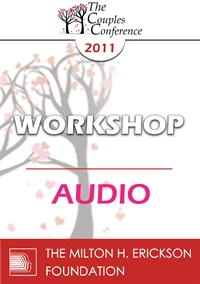
- Average Rating:
- Not yet rated
- Topic Areas:
- Workshops | Communication | Love | Couples Therapy | Family Systems
- Categories:
- Couples Conference | Couples Conference 2011
- Faculty:
- Richard Schwartz, PhD
- Duration:
- 1:57:57
- Format:
- Audio Only
- Original Program Date:
- Apr 02, 2011
- Short Description:
- This workshop is designed to help you and your partner learn how to achieve courageous love, based on the presenter’s Internal Family Systems model of psychotherapy. When couples have self-led conversations, their relationships harmonize naturally. They can discuss even highly charged issues productively and feel safe to reveal their most vulnerable parts to each other.
- Price:
- $15.00 - Base Price
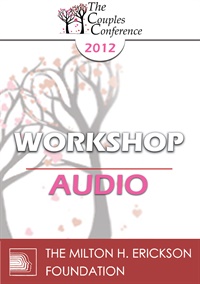
- Average Rating:
- Not yet rated
- Topic Areas:
- Couples Therapy | Workshops | Psychobiological Approach to Couples Therapy (PACT) | Psychotherapy | Communication
- Categories:
- Couples Conference | Couples Conference 2012
- Faculty:
- Stan Tatkin, PsyD, MFT
- Duration:
- 1:28:49
- Format:
- Audio Only
- Original Program Date:
- Apr 27, 2012
- Short Description:
- A psychobiological approach to couple therapy utilizes a bottom-up versus a top-down approach to psychotherapy. This means that the couple’s therapist utilizes very fast, often surprising interventions in order to access implicit systems as revealed in micro expressions and micro-movements in the face and body, respectively. This workshop will introduce several exciting bottom-up techniques to use in couple therapy, including the use of surprise statements, movements, poses, and music.
- Price:
- $15.00 - Base Price
- Average Rating:
- Not yet rated
- Topic Areas:
- IMAGO | Workshops | Communication | Couples Therapy
- Categories:
- Couples Conference | Couples Conference 2012
- Faculty:
- Harville Hendrix, PhD
- Course Levels:
- Master Degree or Higher in Health-Related Field
- Duration:
- 1:55:52
- Format:
- Audio and Video
- Original Program Date:
- Apr 28, 2012
- Short Description:
- Ever since Freud’s patient dubbed psychoanalysis a “talking cure,” most forms of therapy include someone talking to a professional. This workshop posits that therapy consists not so much in the action of talking but in the experience of how one is listened to while they talk, and that the more accurate name for successful therapy is the “listening cure.”
- Price:
-
Sale is $29.00
price reduced from Base Price - $59.00
Please wait ...



